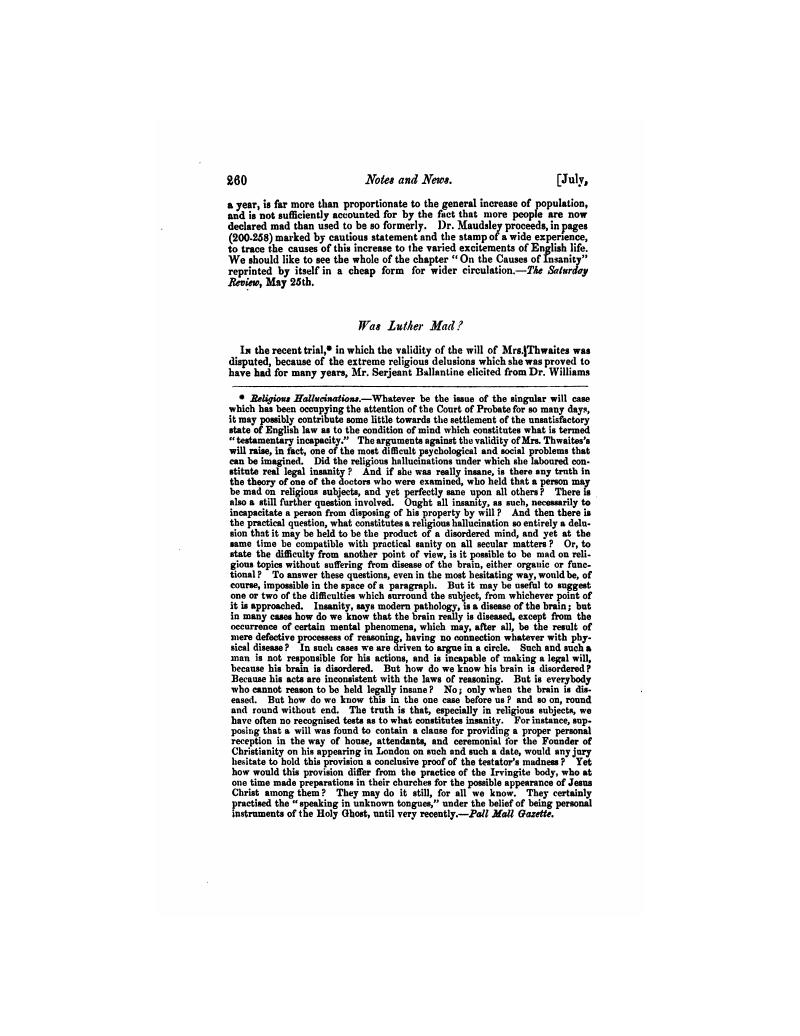No CrossRef data available.
Article contents
Was Luther Mad?
Published online by Cambridge University Press: 19 February 2018
Abstract

- Type
- Part IV.—Notes and News
- Information
- Copyright
- Copyright © Royal College of Psychiatrists, 1867
References
∗ Religious Hallucinations.—Whatever be the issue of the singular will case which has been occupying the attention of the Court of Probate for so many days, it may possibly contribute some little towards the settlement of the unsatisfactory state of English law as to the condition of mind which constitutes what is termed “testamentary incapacity.” The arguments against the validity of Mrs. Thwaites's will raise, in fact, one of the most difficult psychological and social problems that can be imagined. Did the religious hallucinations under which she laboured constitute real legal insanity? And if she was really insane, is there any truth in the theory of one of the doctors who were examined, who held that a person may be mad on religious subjects, and yet perfectly sane upon all others ? There is also a still further question involved. Ought all insanity, as such, necessarily to incapacitate a person from disposing of his property by will ? And then there is the practical question, what constitutes a religious hallucination so entirely a delusion that it may be held to be the product of a disordered mind, and yet at the same time be compatible with practical sanity on all secular matters ? Or, to state the difficulty from another point of view, is it possible to be mad on religious topics without suffering from disease of the brain, either organic or functional P To answer these questions, even in the most hesitating way, would be, of course, impossible in the space of a paragraph. But it may be useful to suggest one or two of the difficulties which surround the subject, from whichever point of it is approached. Insanity, says modern pathology, is a disease of the brain; but in many cases how do we know that the brain really is diseased, except from the occurrence of certain mental phenomena, which may, after all, be the result of mere defective processess of reasoning, having no connection whatever with physical disease ? In such cases we are driven to argue in a circle. Such and such a man is not responsible for his actions, and is incapable of making a legal will, because his brain is disordered. But how do we know his brain is disordered ? Because his acts are inconsistent with the laws of reasoning. But is everybody who cannot reason to be held legally insane ? No; only when the brain is diseased. But how do we know this in the one case before us P and so on, round and round without end. The truth is that, especially in religious subjects, we have often no recognised tests as to what constitutes insanity. For instance, supposing that a will was found to contain a clause for providing a proper personal reception in the way of house, attendants, and ceremonial for the Founder of Christianity on his appearing in London on such and such a date, would any jury hesitate to hold this provision a conclusive proof of the testator's madness? Tet how would this provision differ from the practice of the Irvingite body, who at one time made preparations in their churches for the possible appearance of Jesus Christ among them P They may do it still, for all we know. They certainly practised the “speaking in unknown tongues,” under the belief of being personal instruments of the Holy Ghost, until very recently.—Pall Mall Gazette.Google Scholar





eLetters
No eLetters have been published for this article.